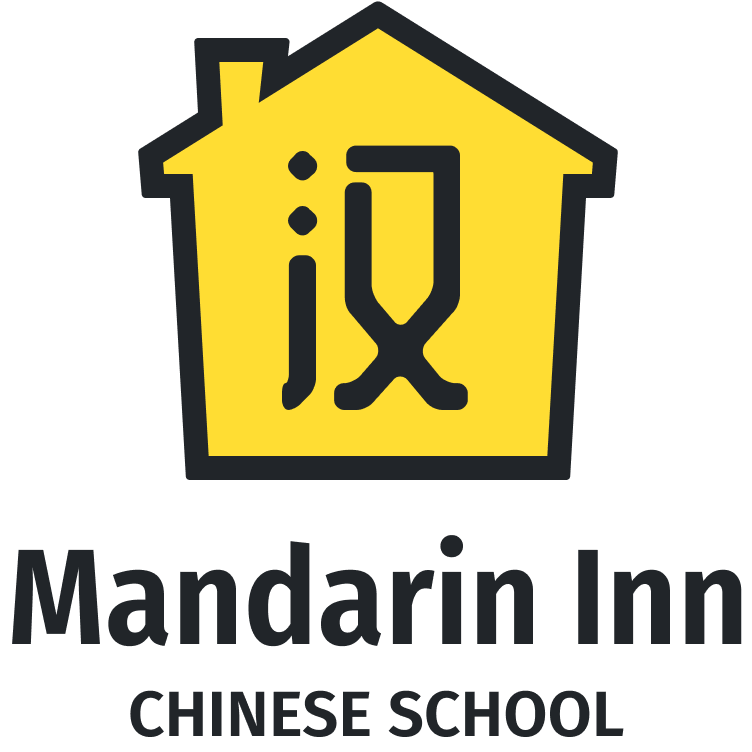
In Chinese culture, the concept of the big family has always been a major topic. People respect elderly relatives and care for their young. Chinese people have a special day to show their love and comemmorate their loved ones who have passed away. 中元节 zhōng yuán jié falls on the 15th of the 7th month of the lunar calendar each year.
During this time, Chinese people believe that the gates of the afterlife are opened, the spirits and ghosts roam the human realm and this is the time when they get to be connected with the spirits of their ancestors.
Up until this day, these are some of the most common traditions that the Chinese still practice:
1. 祭祖 jì zǔ / Ancestor Worshiping
The Chinese believe their ancestors will return home to visit their descendants at this time, so they need to prepare tributes/offerings to them. Ancestor Worshiping is the embodiment of traditional ethics, which is the expression of being cautious in pursuing the future and solidifying the source of thinking.
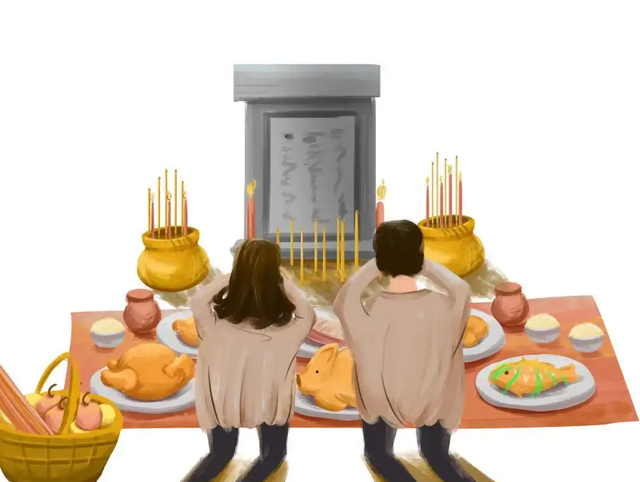
Do you know what are the articles of tribute they bring? Here are some of the most common items:
- Braised pork belly (红烧肉 hóng shāo ròu )
- Pan fried fish(鲫鱼 jì yú )
- Egg dumpling(蛋饺 dàn jiǎo )
- Fried ball(油泡 yóu pào)
- Stir-fried chicken(炒鸡块 chǎo jī kuài )
- Sauteed bean sprouts(黄豆芽 huáng dòu yá )
- Sauteed leek(韭菜炒百叶 jiǔ cài chǎo bǎi yè )
- White gourd soup(冬瓜汤 dōng guā tāng )
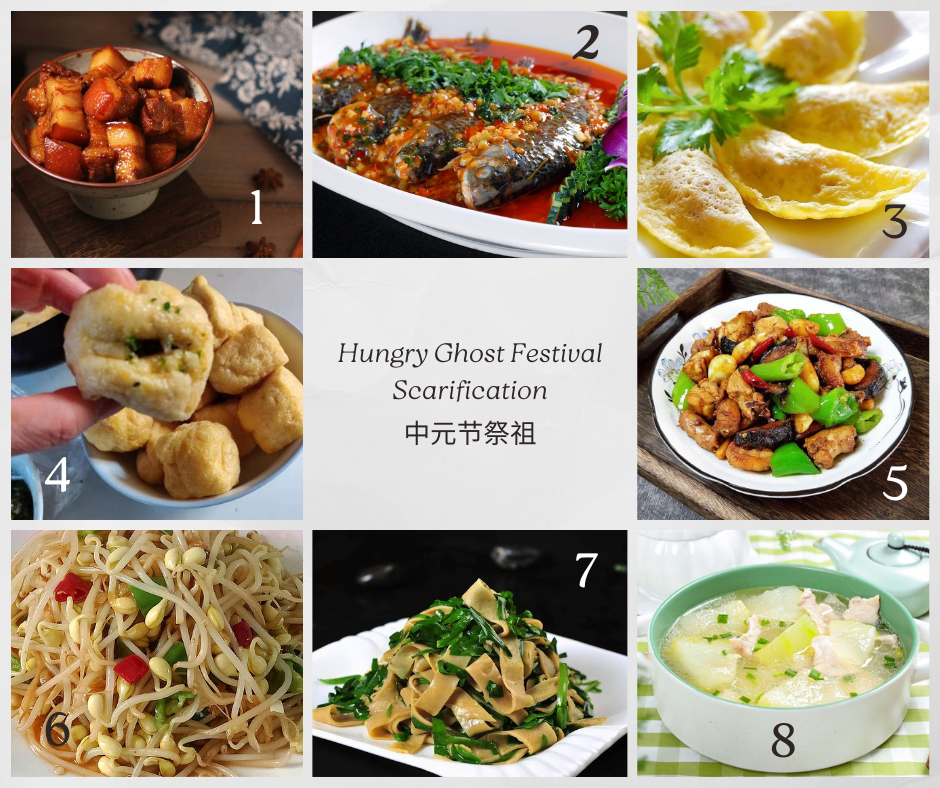
2. 放河灯 fàng hé dēng / Putting lantern on the river
The purpose of the river lamp is to put the fallen spirits and other lonely spirits in the water. The meaning of the river lamp is to place the memory of the ancestors, and also symbolize the flow of bad luck with the water.

The Chinese culture is known to significantly emphasize maintaining a strong sense of family hierarchy. Therefore, it is essential to correctly address your relatives! Are you often puzzled when calling them? Find out the answer here!
To start off, you should know that the Chinese differ in addressing the paternal and maternal sides of the family.
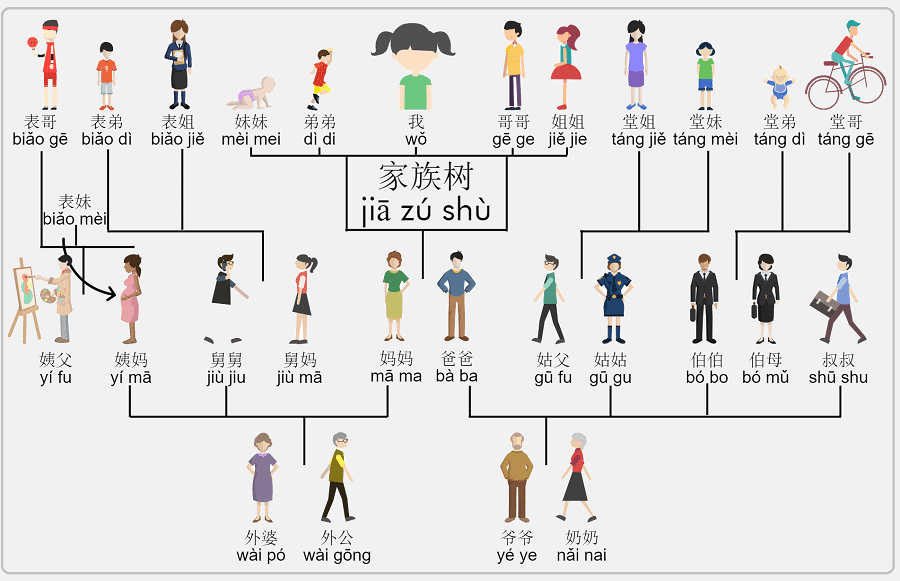
Grandparents
Paternal grandpa: 爷爷 yé ye or 阿公 ā gōng
Paternal grandma: 奶奶 nǎi nai or 阿妈 ā mà
Maternal grandpa: 外公 wài gōng
Maternal grandma: 外婆 wài pó

Uncle
Father’s older brother: 伯父 bó fù
Father’s younger brother: 叔叔 shú shu
Father’s sister’s husband: 姑丈 gū zhàng
Mother’s brother: 舅舅 jiù jiu
Mother’s sister’s husband: 姨丈 yí zhàng
The Chinese also put emphasize on seniority.
For example, if your father has two older brothers, you would call the eldest brother 大伯 (dà bó), which means ‘big uncle’ and the next eldest 二伯 (èr bó), which means ‘2nd uncle’.
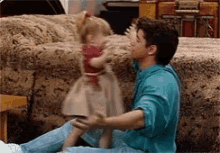
Aunt
Father’s sister: 姑姑 gū gu
Father’s brother’s wife: 婶婶 shěn shen
Mother’s sister: 阿姨 ā yí
Mother’s brother’s wife: 舅妈 jiù mā
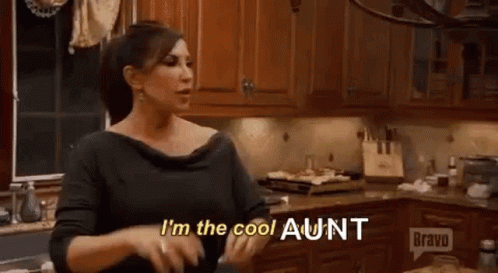
Cousins
The terms for cousins on your father’s side all start with 堂(táng)
堂哥 táng gē :older male cousin on dad’s side
堂弟 táng dì : younger male cousin on dad’s side
堂姐 táng jiě :older female cousin on dad’s side
堂妹 táng mèi :younger female cousin on dad’s side
For cousins on your mother’s side, the terms all start with 表 (biǎo)
表哥 biǎo gē :older male cousin on mom’s side
表弟 biǎo dì : younger male cousin on mom’s side
表姊 biǎo jiě :older female cousin on mom’s side
表妹 biǎo mèi :younger female cousin on mom’s side

There are also other family member nicknames that you might want to know:
Father-in-law : 岳父 yuè fù
Mother-in-law : 岳母 yuè mǔ
Son-in-law : 女婿 nǚ xù
Daughter-in-law: 儿媳 ér xí
Stepfather : 继父 jì fù
Stepmother : 继母 jì mǔ
Stepson: 继子 jì zǐ
Stepdaughter : 继女 jì nǚ
Fiancé (man who will be married) : 未婚夫 wèi hūn fū
Fiancée (woman who will be married) : 未婚妻 wèi hūn qī
Niece (brother’s daughter) : 侄女 zhí nǚ
Niece (sister’s daughter) :外甥女 wài shēng nǚ
Nephew (brother’s son): 侄子 zhí zi
Nephew (sister’s son) : 外甥 wài shēng
Grandson (son’s son) : 孙子 sūn zi
Grandson (daughter’s son) : 外孙 wài sūn
Great-grandson : 曾孙 zēng sūn
Granddaughter (son’s daughter) : 孙女 sūn nǚ
Granddaughter (daughter’s daughter) :外孙女 wài sūn nǚ
Great-granddaughter : 曾孙女 zēng sūn nǚ

After learning these Chinese family culture nicknames, make sure to address your Chinese family members correctly the next time you meet them!
Curious to learn more? We’ve got you covered! Mandarin Inn offers Chinese classes, where you can get yourselves immersed in both the language and culture! Sign up for a free trial class or cultural workshops at Mandarin Inn by scanning the QR code below!

